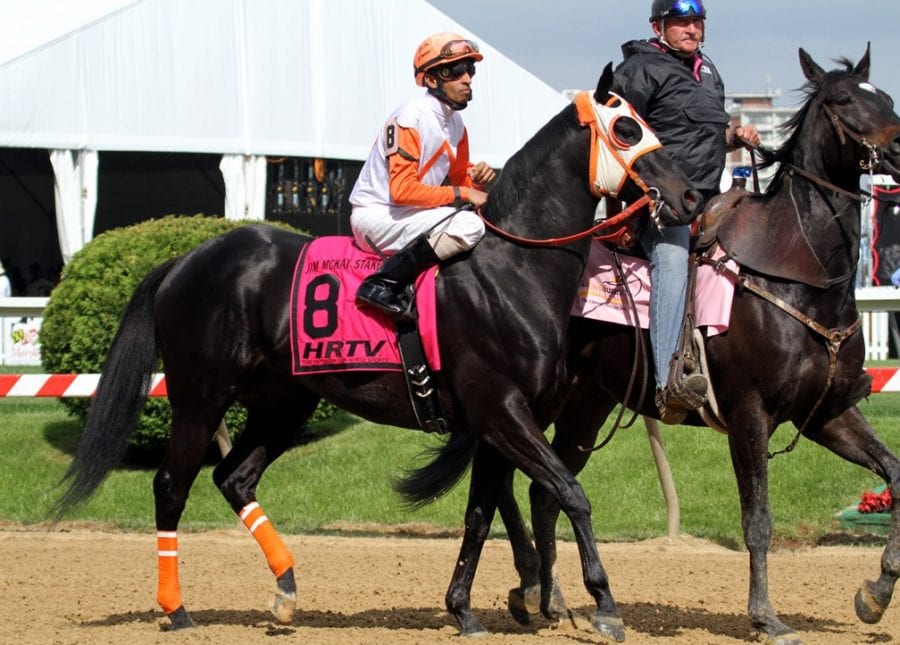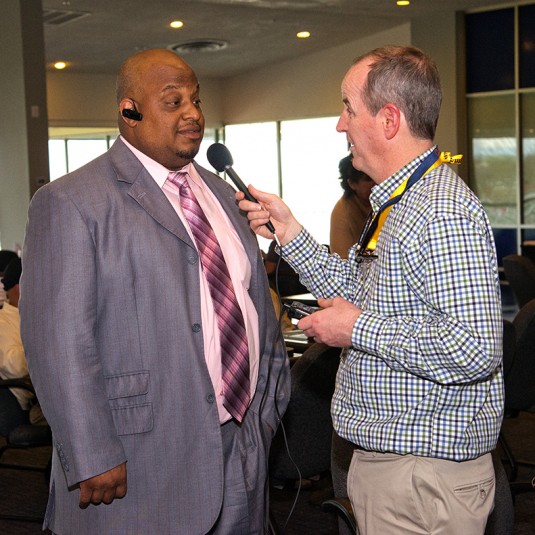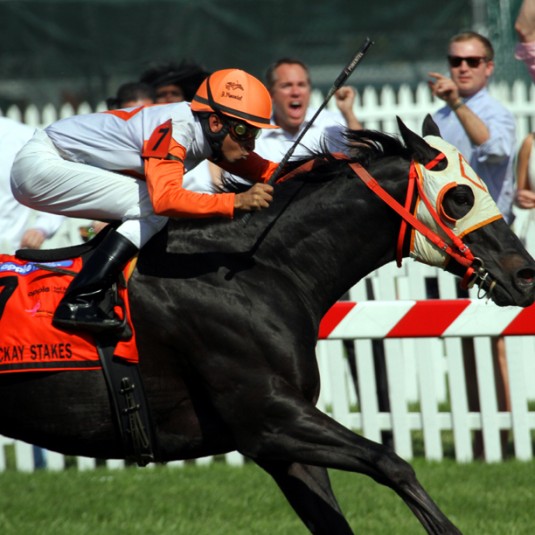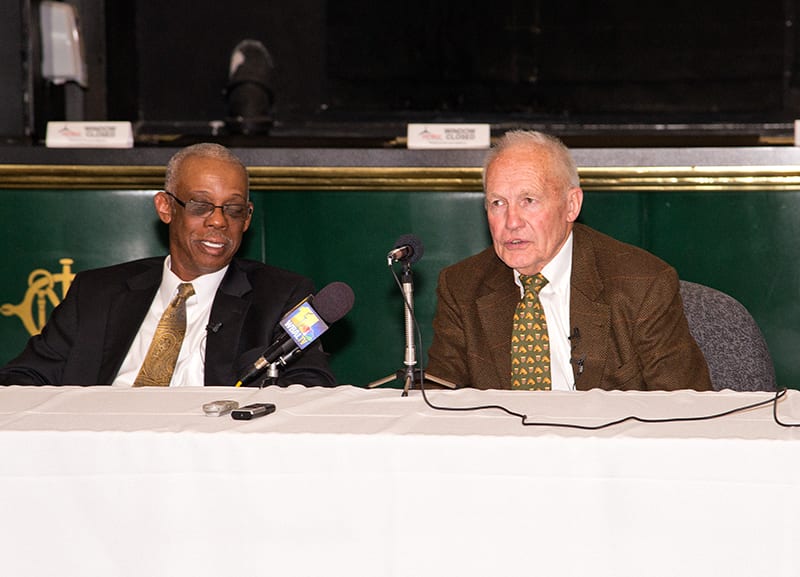
King Leatherbury (right) and Kenneth Taylor, co-owner of Xtra Heat, hold court on Monday at Pimlico. Photo by Jim McCue, Maryland Jockey Club.
Note: This story originally appeared in April.
by Frank Vespe
“Some trainers have access to million dollar yearlings, and some trainers don’t have anything,” says King Leatherbury.
And that, to a not insignificant extent, is the difference between those we know and those we don’t. Or, Leatherbury didn’t have to add, those who make the Hall of Fame, and those who don’t.
Yet Leatherbury will enter the Hall of Fame August 7 without having had the million dollar yearlings, having instead mostly claimed his way to the Hall. And, oddly enough, for a man best known for his astute claiming of horses, his two most significant runners of recent years — the two horses that kept him in the public eye long enough to garner the recognition he so richly deserved — were homebreds.
“Ah Day came first, then Ben,” says Avon Thorpe, Leatherbury’s top assistant and a man who has worked in the Leatherbury operation for 3,600 or so wins, he estimates. “Ah Day came first, and we were on the scene, and he was just winning and winning and winning. And then when he started tailing off, Ben’s Cat showed up right at the perfect time. And then he started winning.”
Ah Day, a son of Malibu Moon out of the Thirty Eight Paces mare Endette, won 14 times for Leatherbury, who bred, owned, and trained him, and earned more than $900,000. As a six-year-old, in 2009, he won the Grade 3 Toboggan Handicap for the only graded score of his career.
By mid-2010 — just as Ah Day head reached the end of his peak productivity — it was time for Ben’s Cat. The horse — already four at the time of his debut — had broken his pelvis at two, thus delaying his debut.
Though Leatherbury derides his breeding efforts as a “shotgun approach,” he was onto something when he bred Ben’s Cat. Ben’s Cat is by Parker’s Storm Cat — a half-brother to Ah Day’s sire Malibu Moon. And Ben’s Cat’s dam, Twofox, is a full sister to Endette.
“Circles come around,” Leatherbury says with a shrug.
Ben’s Cat made his debut in maiden claiming company, available for the price of $20,000.
” I told him, ‘Are you crazy? This horse worked so good,'” says Thorpe. “He was like, ‘He’s four-years-old, ain’t nobody gonna claim him.'”
A modestly bred sort — Parker’s Storm Cat failed to catch on in Maryland — Ben’s Cat skated through his debut to a nearly two-length victory. He survived an objection for impeding another runner to get the win and returned to the Leatherbury barn and, Thorpe thought, safety.
Not so fast.
In his second start, Leatherbury moved the horse up — but just a tick, to the $25,000 level.
Recalls Thorpe, “I said, ‘What are you doing?’ He was like, ‘Avon, he’s four-years-old.’ I said, ‘I’m telling you, he’s that good.'”
“Foolish,” Leatherbury calls the decision to run Ben’s Cat for a tag in his second start.
On the one hand, we can see the foolishness now. Ben’s Cat has gone on to win 28 races, including four graded stakes, and earned more than $2.3 million.
On the other hand, he went off in his second race at 6-1. It’s not as if his stardom was immediately apparent and, anyway, you don’t get to more than 6,400 wins without taking a chance from time to time. Trainers like Leatherbury — who don’t have access to those fancy yearlings — make their money by winning races.
“A horse trainer is like a manager of an athlete, only it’s an animal athlete,” Leatherbury explains. “It’s the exact same thing. If you get a prize fighter, what you’re going to work on is getting him in good shape, keeping him in good physical shape, trying to pick opponents that he can beat.”
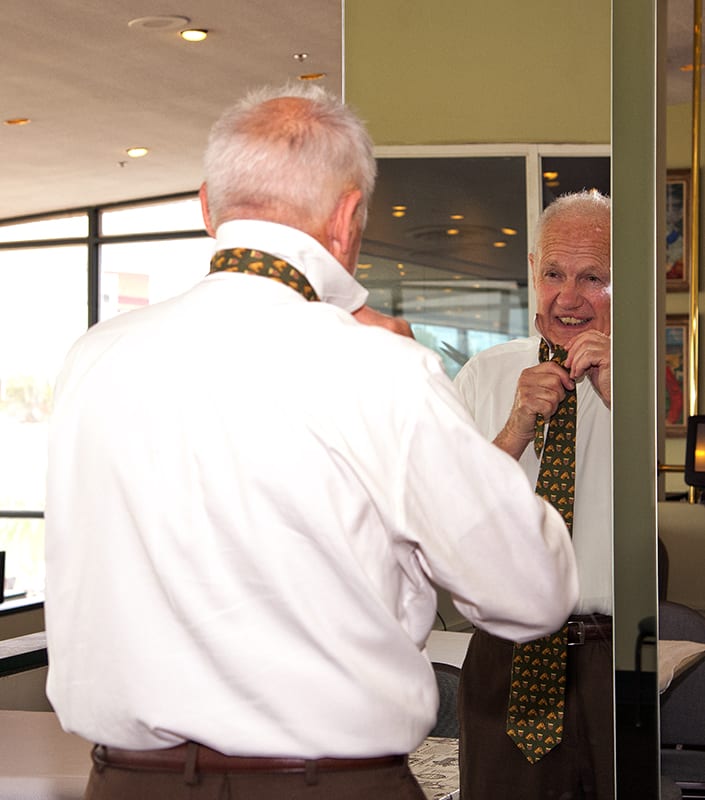
King Leatherbury puts on his tie prior to Monday’s press conference at Pimlico. Photo by Jim McCue, Maryland Jockey Club.
And that’s what Leatherbury has made a career of doing: taking chances, but doing it judiciously, with a careful eye on the odds.
He’ll take a shot, of course — he did, after all, claim Taking Risks for $20,000 in November 1993 and proceed to win the Grade 1 Iselin Handicap with hiim just nine months later — but he’ll keep his powder dry, too. Ah Day was under consideration for the 2006 Preakness after his impressive win in that year’s Federico Tesio Stakes, but Leatherbury’s handicapping of the middle jewel led him to pass.
That’s the game that Leatherbury’s been playing for nigh on 60 years, the careful measuring of risk versus reward.
“I enjoy claiming because it’s more action, faster [than breeding],” he says. “I can claim a horse Thursday, run him back three weeks later. So I enjoy that because of the action. It’s almost like handicapping — it is handicapping, but you’re not handicapping to bet on that horse, what he does that day, what you’re thinking about, you’re betting on the next couple of months. I enjoy that a lot.”
Yet when Leatherbury, a University of Maryland graduate, began his training career, he says that claiming another’s horse was “taboo, man.”
“If you claimed somebody’s horse 50 years ago, they’d get mad at you,” Leatherbury recalls. “I remember one guy at Laurel… I claimed his horse, didn’t think anything of it. I walk down to the paddock, he’s standing there. He says, ‘King.’ I looked over at him, he says, ‘I’ll be watching everything you run now.'”
Leatherbury smiles at the memory. “And I laughed – I mean, he was serious, and I kind of laughed because it’s a funny thing to say. He’s going to be watching everything I run. Well, if you’re claiming horses, you want to watch everything.”
That wasn’t the only time Leatherbury had it out with a fellow trainer angry over a claim.
“I made fun of somebody one time. He said, ‘You claimed my horse.’ I said, ‘You didn’t know that the money is laying there for you in the office? You got money there, man.'”
Then, making his hands into two sides of a scale, he adds, “I said, ‘Look. You got the money, I got the horse. We won’t know who’s better off until about three months from now.’ So that was the game.”
Over time, Leatherbury — as well as trainers like the other members of Maryland’s so-called Big Four, Bud Delp (also in the Hall of Fame), Dick Dutrow, and John Tammaro, Sr. — claimed so frequently that the taboo eroded. It became, King says, “a way of business.”
Times have, indeed, changed, evolution the 82-year-old Leatherbury has both witnessed and participated in. For one thing, he points out, a rival trainer these days might buy you a drink for claiming his horse rather than threaten you. For another, his stable — once so large that he had to split it into two divisions — is now down under 20 runners, a state of affairs he laments, but understands.
“My age holds me back now,” he says, “because if a young guy goes to get in the business, he’s going to go to some up-and-coming young trainer. He’ll think, ‘Leatherbury’ll drop dead on me.'”
It’s a classic Kingism: hard truth wrapped in a Henny Youngman-esque wisecrack. A spoonful of sugar to make the medicine go down.
(Sample crack from his Monday press conference: “The east coast of Florida is where the old people live. The west coast is where their parents live.”)
Yet if age is catching up with him — and who among us does it not catch, eventually? — the evidence is not visible on the racetrack. His runners are winning at a 20 percent rate so far in 2015, and the best of them, nine-year-old Ben’s Cat, has made just one start, finishing second last week in his seasonal debut.
Maybe his longevity has something to do with process, and routine, with journeys rather than destinations.
While his Big Four brethren — Delp and Tammaro and Dutrow — all moved on to brighter lights and bigger cities (or tried to), Leatherbury stayed home, delighting in the Daily Racing Form columnist who called him “as Maryland as crab cakes.”
And even now, in the autumn of a career, and a life, on the cusp of receiving the honor of a lifetime, he shrugs it all off.
“I’ve been honored so many times — if you saw my house, and the trophies, it’s really ridiculous,” he laughs. “You go to try to clean those things, you see what I mean. It was another honor, another award, basically, a higher one. That was it. If it came good, if it didn’t come, so be it.”
He adds, “It wasn’t going to change my life. It’s a title. It’s not going to bring me any horses in to train.”
Whether Leatherbury wanted the title or not, Thorpe says it’s richly deserved.
“My take is absolutely, he definitely needs to be there,” the assistant says. “He’s the best. His name ain’t King for nothing.”
[su_box title=”KING LEATHERBURY FILE” style=”glass”][su_list icon=”icon: check”]
- BORN March 26, 1933, in Baltimore, MD
- CAREER STATS (through 2014, starts-1st-2nd-3rd-earnings) 35,933-6,446-5,250-4,587-$62.7 million
- CAREER HIGHLIGHTS 52 training titles at Laurel Park and Pimlico… 4 consecutive 300-win campaigns, 11 straight over 200, led the nation in wins in 1977 and 1978… Has recorded a six-win day and four five-win days… Ranks fourth among trainers by all-time wins… Recorded his first win in 1959 at Sunshine Park (now Tampa Bay Downs)… Has saddled four Preakness starters, including Thirty Eight Paces (1981) and I Am The Game (1985), both of whom finished fourth… Has registered grade 1 wins with Catatonic (1987 Hempstead) and Taking Risks (1994 Iselin).
- TOP RUNNERS
- Taking Risks
- Catatonic
- I Am The Game
- Ben’s Cat
- Ah Day
- Indigo Star
- Thirty Eight Paces
- Malibu Moonshine
- Ameri Valay
- Learned Jake
- Dynamic Trick

